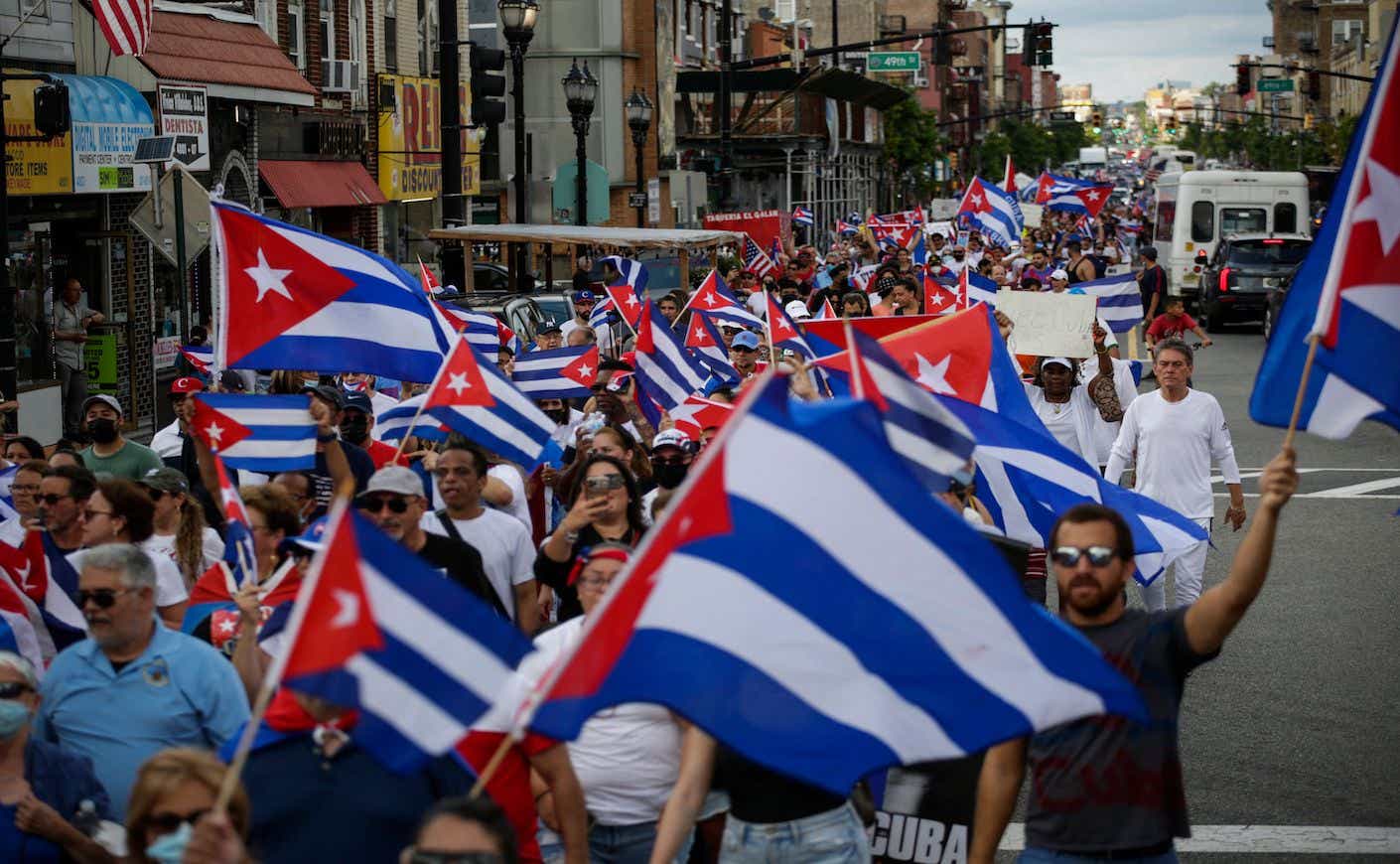Written and reported by Tess Bonn.
Cuba’s currently in the midst of unprecedented unrest. On July 11th, thousands of protesters risked jail to protest the Communist government’s handling of its crippling economic collapse, food shortages, and repeated power outages.
As the U.S. still grapples with how to approach the situation, we looked into what’s going on in Cuba and what’s behind the upheaval and why it could usher in historic change.
Why are Cubans protesting?
The unrest was in response to an accumulation of problems. Cuba’s tourism industry has been hit hard by the coronavirus pandemic and ongoing U.S. sanctions. Increased inflation and shortages of critical supplies of medicine and food have only exacerbated the situation.
Amid worsening conditions, anti-government demonstrations started in San Antonio de los Baños, southwest of Havana, before spreading throughout the rest of the country. “There is no food, no medicine, there is no freedom,” one protestor told BBC Mundo. “They do not let us live.”
Police responded by arresting dozens of protesters — with some reportedly being beaten and hit with pepper spray — and human rights groups say more than 500 people were detained in the immediate aftermath. Now around a dozen of these demonstrators are facing charges that could carry up to 20 years in prison.
Why are these protests different than previous Castro-related unrest in Cuba?
For one thing, the protests were widespread, and there didn’t appear to be a formal organizer behind them. People found about it largely from Twitter and Facebook, prompting the Cuban government to quickly crack down on these platforms.
The widespread unrest subsequently marked a major test in leadership for Cuban President Miguel Díaz-Canel, the first head of the Cuban Communist Party who isn’t from the Castro family that has ruled the island for six decades.
After his government largely blamed the U.S. and social media for the unrest, Díaz-Canel admitted to the government’s failures in handling food and power shortages.
“We have to gain experience from the disturbances,” he said during a televised address. “We also have to carry out a critical analysis of our problems in order to act and overcome, and avoid their repetition.”
What’s the solution for Cuba?
Over the past year, the Cuban government has taken two big steps: It announced the devaluation of the peso for the first time since the 1959 revolution, and it said it would allow private businesses to operate in most sectors of the state-controlled economy.
Still, economists believe that the island needs some outside help. Economist Pavel Vidal, who previously worked at Cuba’s Central Bank, told The Washington Post, that Cuba needs to join international financial institutions and integrate itself into the global market, moves that would require negotiations with the Biden administration. This would be no easy task as bilateral relations have been notoriously strained for more than 60 years following Fidel Castro’s overthrow of the U.S.-backed government.
What has Biden said about the protests going on in Cuba?
The protests are now forcing President Biden’s hand as he has yet to issue any reversal to the Trump administration’s hardline policies, including taking Cuba off the list of state sponsors of terrorism. The bilateral relationship thawed considerably under President Obama, but many restrictions such as banning travel were reimposed by President Trump.
Even though Biden initially showed little desire to roll back any of Trump’s policies, Biden was quick to express his solidarity, saying the U.S. “stands firmly” with the Cuban people. And just this week, Biden started taking steps to review the U.S. policies established by Trump toward Cuba, and is now weighing whether to allow remittances to Cuba along with reestablishing consular services on the island. These actions would allow Cubans to seek U.S. visas and enable Americans to send money and medicines to relatives in Cuba.
The question now is whether Biden will take more bold action. American University professor Fulton Armstrong expressed concerns that Biden so far has been “too cautious.” Though Biden campaigned on resuming Obama-era policies, he hypothesizes that Biden has concerns over what any substantial change would mean for support among Cuban-American communities in states like Florida, where Trump and Republicans dominated during the 2020 election.
How is Florida helping Cuba?
Florida has the highest concentration of Cuban Americans in the U.S., in part because of its proximity to Cuba, followed only by California, New Jersey, Texas, and New York.
“I’m really stunned at the shallowness of this administration’s approach to Cuba,” said Armstrong, who worked on Cuba issues for Congress, the White House, and the State Department. “They’re pursuing a Miami policy, not a Cuba policy.” He advised the administration to take more decisive action and set a clear policy, which he says will ultimately win over his critics.
Florida Democrats, meanwhile, see the situation as a real chance to drum up more Latino support for the next election cycle, and pave the way for the U.S. to make a historic change in foreign policy. “What happened this past weekend is what 12 previous U.S. presidents were waiting for: the uprising of the Cuban people themselves as they stand up against their communist overlords,” said Florida pollster Fernand Amandi, who is a Democrat and son of Cuban immigrants.









